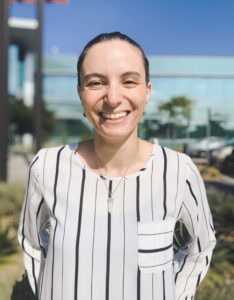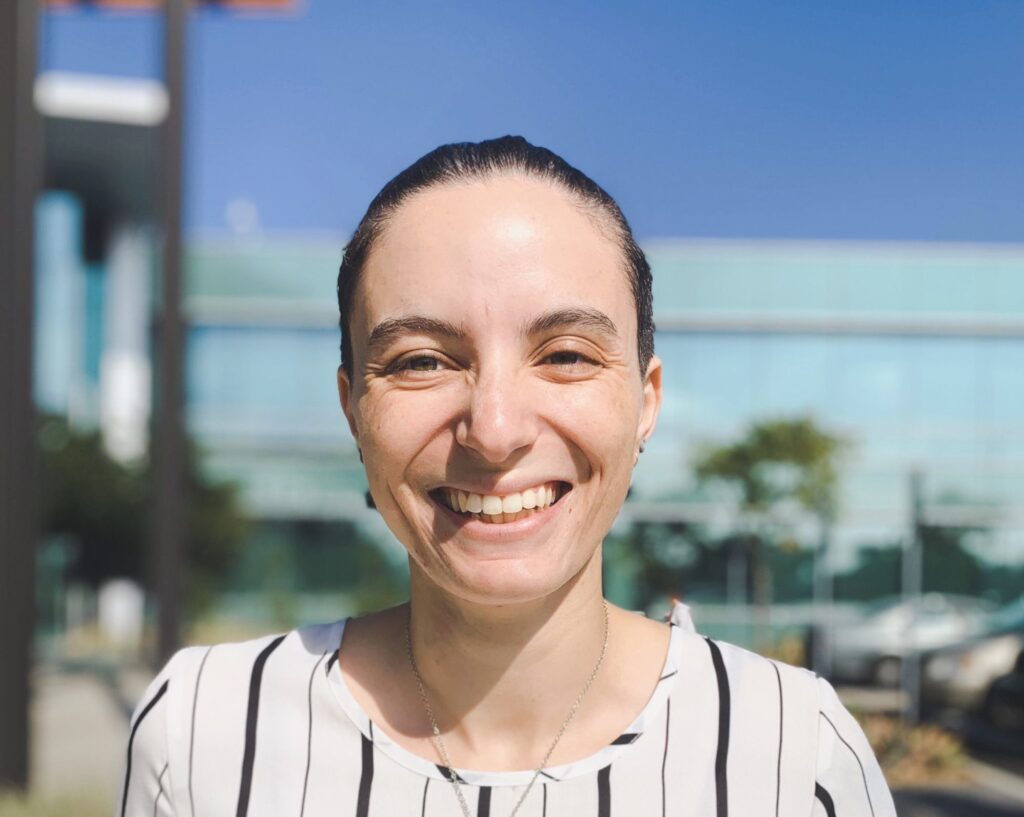We’re taking time to get to know the members of the GSA’s Early Career Scientist Committees. Join us to learn more about our 2021 early career scientist advocates.

Courtney McClure
Community and Membership Engagement Subcommittee
University of California, Los Angeles
Research Interest
Chlorpyrifos (CPF) is a widely used organophosphate pesticide that is found in soil, urban streams, and agricultural food products. Although epidemiological evidence suggests a link between CPF exposure and neurobehavioral disorders such as depression and anxiety, we still don’t know the underlying mechanisms. We also don’t know the effects of CPF exposure to generations beyond those directly exposed (transgenerational effects). To understand transgenerational effects, we know that the F1 generation is directly exposed as embryos, the F2 is exposed through the germline, with the F3 being the first generation that has not been directly exposed to the toxicant.
My research focuses on investigating these effects and how they affect the serotonergic system. Serotonin is a molecule implicated in neurobehavioral disorders such as depression and suicide, and plays an important role in behavioral plasticity, memory, and learning. Animal studies have shown a connection between CPF exposure in the parental generation during different gestational timepoints. These animal studies are important because they demonstrate time of exposure through changes between gestational timepoints, as well as with serotonin modulation, which can be seen in such ways as downregulation of serotonin receptors. However, effects beyond exposure to the directly exposed generation have yet to be investigated. Even though CPF is known to affect transgenerational mechanisms, such as germ cells and the epigenome, the outcomes have yet to be assessed.
CPF exposure can have major impacts on serotonin and the neurobehavioral disorders that are linked to its modulation, and my research focuses on elucidating the mechanisms behind them through a behavioral and transgenerational lens using C. elegans, which is a 1 mm long worm. C. elegans is ideal for transgenerational and behavioral studies due to its ease of maintenance, short life cycle, well-characterized nervous system, and defined serotonin-mediated behaviors. I use C. elegans to determine the effects of CPF exposure on the serotonergic system by assessing how it affects behaviors in the worm and how these effects can then be passed down from the parental generational to later generations that are not directly exposed.
As a PhD-trained scientist, you have many career options. What career paths interest you the most?
My goal is to become a tenured professor at a primarily research and teaching institution, so I can teach and mentor young scientists. I believe good mentoring is an essential part of a student’s progress, and this is a skill I hope to further develop. Taking time to invest in a student’s journey, such as checking in on their project and advising them in their career goals, is important for their development and is a goal I wish to pursue in my daily work life.
My passion for managing research projects started when I became an undergraduate mentor. The first time that the undergraduates I was working with presented their research project at lab meeting, I realized how amazing it had been to watch their development as researchers. We started the project with just an idea, the results of which they were presenting after months of slow but steady progress. Given the tools to succeed, they put in the hard work needed to produce results, which included persevering past unfruitful results and troubleshooting protocols. Most importantly, they learned to work together as a team to attain their goal, despite all the obstacles. Mentoring provides a path to success for younger scientists, encouraging and supporting them on the way, and this has become an important part of my mission as a scientist.
After the completion of my PhD, I would like to transition into a postdoctoral research position, in order to get the training needed to become an assistant professor on the tenure track. As a scientist, I want a significant part of my focus to be on new initiatives to increase diversity in the sciences, because diverse minds make for great science. Increasing minority representation will create new and exciting collaborations. To accomplish this, I want to build upon my previous experience as a mentor and as a minority.
An alternate career path I have considered is an associate scientist position in a research laboratory, which would allow me more time to focus on benchwork, while also allowing me to accomplish my previous goals. However, I am open to additional career paths. One thing I really enjoy about the scientific community is that there is always another avenue to explore, another person to network with, or another opportunity to take advantage of. Above all, I want a career that will allow me to continue with cutting-edge research, training, and future collaborations.
In addition to your research, how else do you want to advance the scientific enterprise?
I want to advance the scientific enterprise by increasing diversity in the sciences. Achieving this requires creating a supportive environment, to ensure that minorities know they have a place in science. This is essential for researchers to advance in their own scientific enterprises. I also believe that promoting networking will help create new collaborations between people that wouldn’t have happened otherwise. For these collaborations, I want to see new and experienced scientists working together, so they can learn from each other.
Fostering science that can touch people and make a difference in their daily lives is one of my primary goals for the future. In service of that goal, I hope to mentor prospective researchers, just as I currently mentor my undergraduate students. When I was applying to graduate school, I did not have adequate mentorship and did not know the benefits of higher education. I want to be a mentor that can provide the knowledge and support I lacked. I believe a supportive and validating mentor can make a significant impact on a mentee’s career, and I enjoy spending time teaching and training my mentees. I want to encourage younger scientists to attain their goal.
I believe that, by creating a successful and inclusive training environment, I can foster the next generation of scientists. I also believe that teaching them to speak up and go after the causes they believe in will also advance the scientific enterprise.
As a leader within the Genetics Society of America, what do you hope to accomplish?
As a member of the Community and Membership Engagement Committee, my goal is to increase networking opportunities as well as improve communication between ECLP members and the larger GSA community. Encouraging networking, communication, and mentoring will build a greater and stronger community.
To do this, I want to create seminars on networking, available to all ECLP members, that will improve our leadership skills. Personally, I hope to develop my own skills as a leader, while also learning how to work as a team. The process of organizing and leading these endeavors will help us all to be a part of something bigger, which will let us gain confidence and build a sense of community.
Previous Leadership Experience
Molecular and Systems Biology Specialty Section (Society of Toxicology) Graduate Student Representative
Biosciences Student Council Representative (UCLA)
Membership Committee (Society of Toxicology) Student Representative
Undergraduate Mentor, Allard Laboratory
Contact Information
Twitter: @courtneyrmcc
LinkedIn: https://www.linkedin.com/in/courtney-mcclure-804367a4/
Website: https://spark.adobe.com/page/DEVpFhm5VPoLo/































